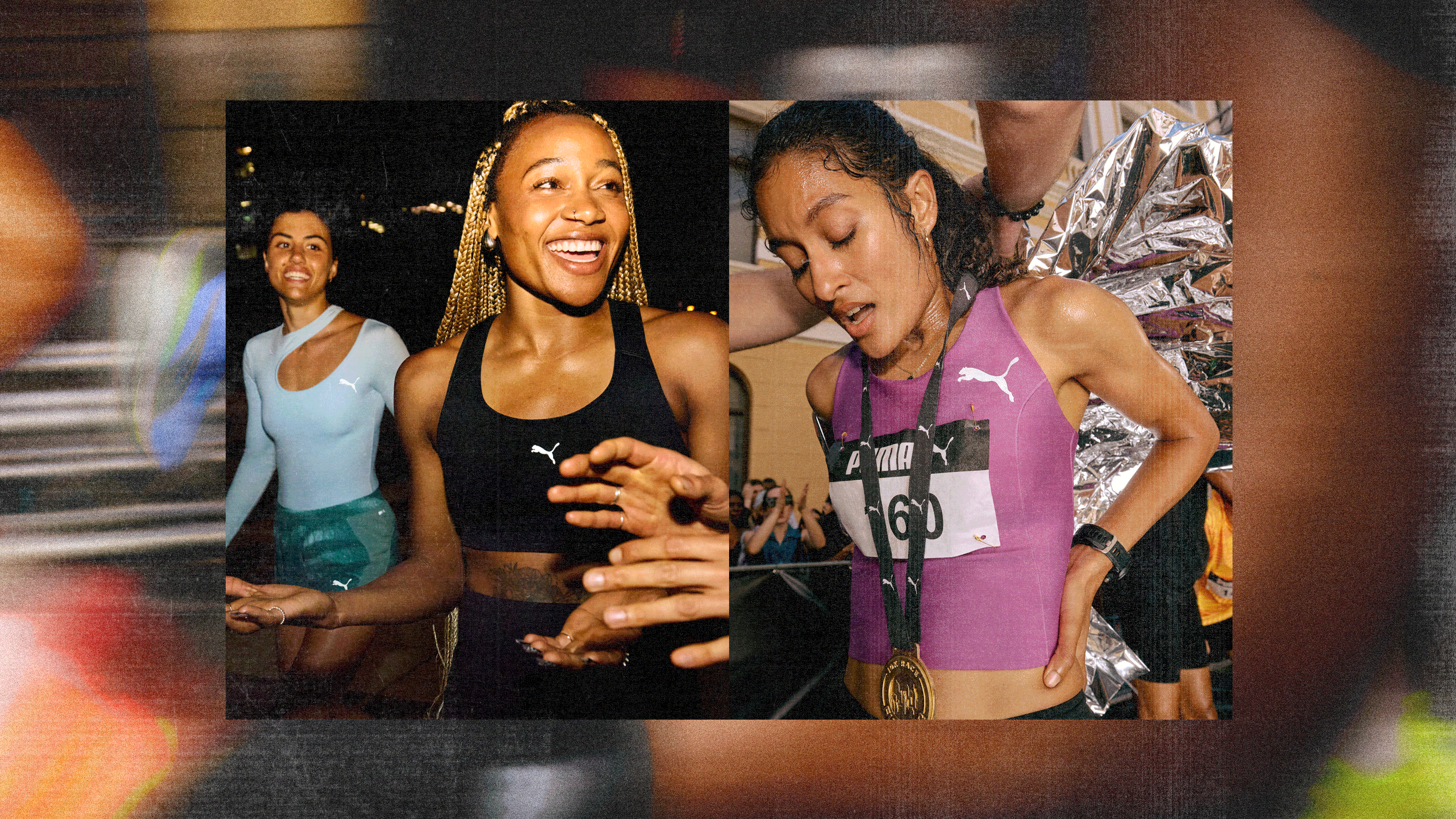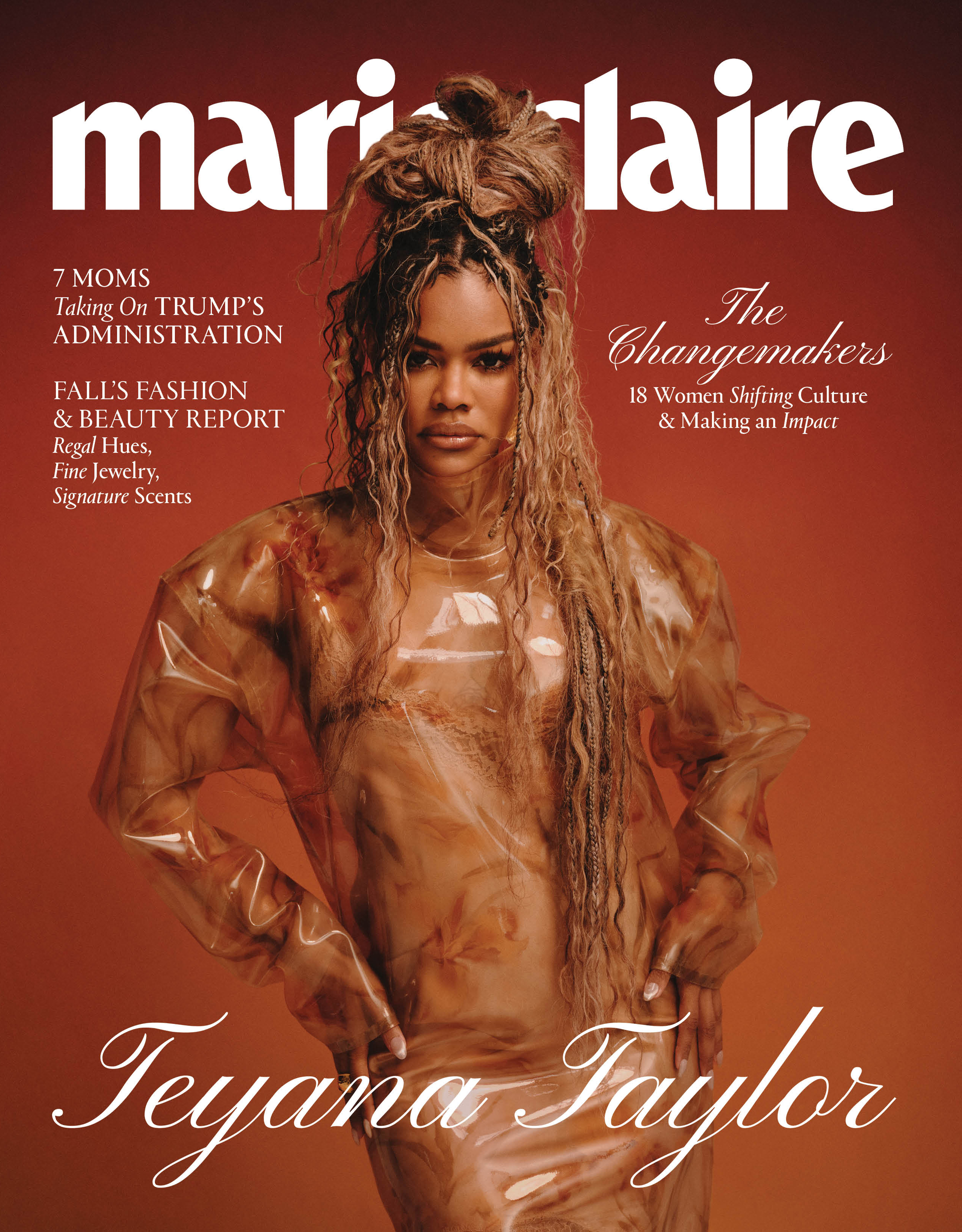The ‘Soft Girl’ Rebellion That Is Redefining Running
From glitter-fueled night races to campaigns centered on joy, women are rejecting old-school fitness culture and rewriting the rules of the sport—with brands racing to catch up.


Select the newsletters you’d like to receive. Then, add your email to sign up.
You are now subscribed
Your newsletter sign-up was successful
Want to add more newsletters?
Aliyah Funschelle has always had an athletic streak. She played basketball growing up, rowed in college, and now toggles between weight training and Spin class. But when her friend asked Funschelle to run a half-marathon with her this past June in L.A., her knee-jerk response was: “Oh, I can’t do that, I’m not a runner,” says the 27-year-old.
But this was no ordinary half-marathon. Announced in February of this year, the Nike “After Dark” event was marketed as a global, all-women tour designed to upend the traditional performance-forward race-day experience in favor of one that highlights the social elements of running.
Instead of crack-of-dawn start times and high-pressure pacing, it featured late-night runs with live DJs, food trucks, and a post-race Doechii concert—a glitter-drenched, confetti-filled block party built to welcome women like Funschelle, who never saw themselves in the sport’s speed-focused culture. Nearly 43 percent of the 15,000 participants were first-time half-marathoners. “I didn’t know if I’d feel crazy for putting on bright-green eyeliner and butterfly clips,” Funschelle says, “but people were treating the race like a celebration.”
That kind of messaging isn’t accidental—it reflects a broader evolution in how running is marketed and who it’s for. The sport has long centered on a specific kind of athlete: elite, competitive, and chasing personal records.
But as more women turn to running for mental health and community, brands are courting a group they have often overlooked.
I’m not, like, a runner—but I run.
“For a long time, running marketing spoke to a narrow audience with a performance-only mindset,” says brand strategist Martha M. Garcia, who has worked with Teva, AHNU, Nike, Hoka, Oiselle, and other sports brands. “Women were either excluded from the conversation or expected to conform to rigid definitions of strength and achievement. These frameworks rarely accounted for the complexity of lived experience: juggling caregiving, navigating body-image pressures, or simply carving out space in male-dominated environments. This evolution in marketing is about expanding the lens.”
Over the past year, athletic companies have rolled out campaigns that emphasize joy, community, and emotional health benefits over performance. In Adidas’s recent “Supernova Rise” campaign, actress Camila Mendes shrugs, “I’m not, like, a runner—but I run.” Purists may scoff, yet the line is intentional and deeply relatable. The campaign isn’t chasing the every-weekend half-marathoner; it’s inviting in the hybrid athlete who lifts, hits Pilates, and jogs a few miles for headspace.
Get exclusive access to fashion and beauty trends, hot-off-the-press celebrity news, and more.
And Adidas is hardly alone. On’s “Soft Wins” campaign earlier this year starred Sesame Street’s Elmo in order to encourage self-compassion and personal growth over finish times. The Swiss brand reported record sales in the first quarter of 2025. Puma’s “Go Wild” initiative ditched the high-performance, elite-driven messaging typically seen in running ads to spotlight everyday runners chasing that runner’s high. Reebok’s “Running Hacks” leaned into humor and relatability, spotlighting influencers like “struggle runner” Erin Azar to dismantle the idea that you need to be fast, fit, or flawless to start.
I have no desire to get faster. I run because it makes my mind feel better, it makes my body feel better, and it brings me community I didn’t have before.
While it may be a savvy business move, it’s also a cultural correction—a chance to make space for runners who’ve been made to feel like they didn’t belong. For women, especially, it’s a kind of liberation. Now you don’t need to run at the speed of light, prove your toughness, or fit a specific mold to show up. You can just run—have fun, even.
Which is how it always should have been. According to Running USA’s 2024 Global Runner Survey, running for enjoyment edges out running to achieve a lofty physical goal. And women are driving much of the growth: Strava reported a 59 percent surge in run clubs this year, with women under 25 as the platform’s fastest-growing demographic.
“We live in such a competitive, fast-paced world—what happens if we slow down and actually enjoy what we’re doing?” says 24-year-old Makenzie Rink. After getting lost on a supposedly “all paces” store run in North Carolina in 2023, she started building the inclusive Realistic Runner community—which now has nearly 26,000 followers on TikTok, has more than 47,000 on Instagram, and is growing in real life. “I have no desire to get faster. I run because it makes my mind feel better, it makes my body feel better, and it brings me community I didn’t have before,” she says.
I just want to finish my run and feel good about myself, and that’s a win for me.
For Rink, feel-good marketing is only the start. “Just because you pour dollars into a campaign doesn’t mean you’re implementing real change,” she says. As the store manager and event coordinator at the soon-to-open J&H Running Co. in Lexington, Kentucky, she’s helping build change from the ground up, by providing a community room for meetups, gear for programs for Girls on the Run, clinics for older adults, and a safe space for middle schoolers to move.
As she sees it, the new culture of running is not about proving something—it’s about reclaiming something. Which is what appealed to Alyssa Davis, 32, from Dallas, Texas. She started running two years ago as part of her weight-loss journey, but she stayed for the support. “In my opinion, there’s been this trajectory from judging others—like, ‘What’s your time?’ and all that—to just cheering each other on,” she says. “I just want to finish my run and feel good about myself, and that’s a win for me.”
This article appears in the 2025 Changemakers Issue.
Ashley Mateo is a writer, editor, and UESCA- and RRCA-certified running coach who has contributed to Runner’s World, Bicycling, Women's Health, Health, Shape, Self, and more. She’ll go anywhere in the world once—even if it’s just for a good story. Also into: good pizza, good beer, and good photos.

